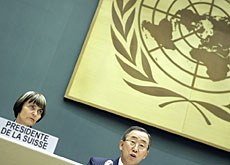Calmy-Rey urges action over poverty and hunger

The Swiss president has called for "exceptional efforts" from the international community to ensure the world meets the United Nations Millennium Development Goals.
Speaking at the UN in Geneva on Monday, Micheline Calmy-Rey urged governments, multilateral agencies, civil society and the private sector to unite to lift millions out of poverty and hunger.
“We already have the knowledge and the experience necessary to enable us to vanquish extreme poverty and hunger,” she said. “And we also have the resources necessary to do so, provided we are ready to mobilise them.”
The appeal by Calmy-Rey, who is also the Swiss foreign minister, came on the opening day of a high-level UN meeting at which concrete commitments are being sought from ministers to meet the millennium goals within the agreed 2015 timeframe.
According to the UN, which maintains that the goals are achievable, more urgency is needed – as are more stable economic conditions in poorer countries to enable growth and job creation.
Calmy-Rey, who described development as the “foremost common objective in creating a world which is… more free and secure”, said it was important that poorer countries came up with their own strategies to combat poverty.
But she said industrialised nations also needed to increase aid, while making their own markets more accessible to developing countries.
Disease and hunger
The UN says progress in meeting the millennium goals, set by global leaders in 2000 to alleviate world poverty, disease and hunger, has so far been mixed.
Some countries, such as China, have made great strides, but success has remained elusive in other places, such as sub-Saharan Africa, where no country is on track to meet goals of halving extreme poverty, ensuring universal primary education or stemming the HIV/Aids pandemic by 2015.
“A strong and sustained effort now can mean the difference between the success and failure of our grand endeavour,” UN Secretary-General Ban Ki-moon said on Monday. “Needless to say, millions of lives quite literally hang in the balance.”
Ban Ki-moon also stressed that richer nations needed to keep promises on development aid. The UN wants countries to raise spending to 0.56 per cent of gross national product by 2010 and to 0.7 per cent by 2015.
Switzerland has come under fire from non-governmental organisations and the Organisation for Economic Cooperation and Development for not doing enough. But the Swiss government insists it will meet UN targets.
Extreme poverty
A 36-page progress report released on Monday by the UN shows it is on track to reduce the proportion of people living on less than $1 (SFr1.2) a day in the developing world to 15.8 per cent from 23.4 percent in 1999. But it is likely to fail to reach the benchmark set for African countries.
“Some progress is being made in those regions where the challenges are greatest,” the report says, citing an increase in women’s political participation and success in the fight against child-killing scourges such as measles. But several factors are holding up overall success in reaching the goals.
“The lack of employment opportunities for young people, gender inequalities, rapid and unplanned urbanisation, deforestation, increasing water scarcity and high HIV prevalence are pervasive obstacles,” the report said.
“Moreover, insecurity and instability in conflict and post-conflict countries make long-term development efforts extremely difficult.”
Several non-governmental organisations, including Action Against Hunger and Swissaid, complained on Monday that the UN was being over-optimistic in its assessment.
They said the number of people suffering from malnutrition was continuing to climb and that world hunger would not be halved by 2015.
swissinfo, Adam Beaumont with agencies
Millennium Development Goals:
1. Eradicate extreme poverty and hunger.
2. Achieve universal primary education.
3. Promote gender equality and empower women.
4. Reduce child mortality.
5. Improve maternal health.
6. Combat HIV/Aids, malaria and other diseases.
7. Ensure environmental sustainability.
8. Develop a global partnership for development.
Millennium goals progress report:
27% of children under five in poorer countries are underweight – a key statistic in measuring global hunger – down from 33% in 1990. The UN still hopes to halve the 1990 figure.
The number of African children receiving primary education has risen to 70% from only 57% at the start of the decade. Globally 12% of children do not attend school, a number that is “unacceptably high”, according to the report.
The number of people living with Aids has risen by 6.6 million since 2001, to 39.5 million. Annual deaths have risen by 700,000 to 2.9 million.
Progress on tuberculosis is not fast enough to halve rates by 2015, especially south of the Sahara, the only region of the world where prevalence has increased this decade.
The child mortality rate in poorer countries has come down 16% since 1990. World leaders in 2000 pledged to cut the rate by 67% by 2015.

In compliance with the JTI standards
More: SWI swissinfo.ch certified by the Journalism Trust Initiative










You can find an overview of ongoing debates with our journalists here . Please join us!
If you want to start a conversation about a topic raised in this article or want to report factual errors, email us at english@swissinfo.ch.